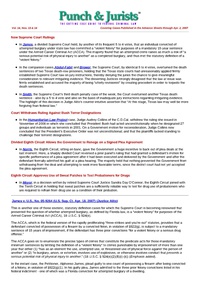Defendant was convicted by a jury in the United States District Court for the Northern District of Illinois, Eastern Division, of distributing cocaine, arising from two controlled-buy sales made to a government informant, which involved a total of 12.1 grams of cocaine. Defendant appealed the within-guidelines 132 month prison …
Retired U.S. Supreme Court Justice Sandra Day O’Connor continues to move about the country, sitting on various appellate panels and adding her experience and prestige to the ruling made by those panels. In the instant case, she authored the panel’s decision, which addressed the defendant’s challenge to the reliability …
From the Decision of the Day Blog:
Another week, another Ninth Circuit denial of en banc review in a case that scales back the Fourth Amendment. Back in September, I blogged about this Ninth Circuit decision, which held that San Diego County could lawfully conduct walkthroughs of the homes …
In U.S. v. Norris, 439 F.3d 916 (8th Cir. Mar. 10, 2006) (“Norris I”), a panel from the Eighth Circuit unanimously held that defendant Jamal Norris was entitled to specific performance of the terms of his plea agreement - even though it had not yet formally been accepted by …
DOD
Prosecutorial immunity is a major issue these days, as commentators wonder whether Durham District Attorney Mike Nifong will face civil liability for his role in the botched Duke lacrosse prosecutions. Although Fourth Circuit law would govern any future lawsuit against Nifong, this Tenth Circuit decision might give plaintiffs’ …
Late last year, in a highly publicized ruling, Judge Audrey Collins held that Presidential Executive Order No.13224 (“EO 13224”), which President Bush signed on Sept. 23, 2001 and which designated 27 groups and individuals as “specially designated global terrorists” (“SDGTs”), was unconstitutionally vague on its face because it contained …
Petitioner federal inmate filed a petition for a writ of habeas corpus, challenging his convictions on charges of murder, racketeering, assault, and drug trafficking. The United States District Court for the District of Massachusetts denied the petition, and the inmate appealed.
A jury returned a verdict finding defendant guilty …
This is another one of those esoteric, statutory definition cases for which the Supreme Court is becoming renowned that presented the question of whether attempted burglary, as defined by Florida law, is a “violent felony” for purposes of the Armed Career Criminal Act (ACCA), 18 U.S.C. § 924(e).
The …
The Supreme Court issued a third death penalty decision last week with the same 5 to 4 line-up of Justices as in the Abdul-Kabir and Brewer cases (above); but with different authors of the majority and dissenting opinions. For the second time in three years, the Supreme Court vacated …
In this case, a panel from the Seventh Circuit unanimously rejected the defendant’s argument that evidence gathered under Foreign Intelligence Surveillance Act ("FISA") cannot be used in domestic criminal investigations or prosecutions.
FISA, which was first enacted in 1978, applied to interceptions the "primary purpose" of which was foreign …
In these companion cases, the Court, by identical 5 to 4 votes, overturned the death sentences of two Texas death-row prisoners, holding that the Texas state courts had unreasonably applied firmly established Supreme Court law on jury instructions.
Abdul-Fabir v. Quarterman, No. 05-11284 (U.S. Sup. Ct. Apr. 25, …
Abdul-Fabir v. Quarterman, No. 05-11284 (U.S. Sup. Ct. Apr. 25, 2007) (Justice Stevens)
Brewer v. Quarterman, No. 05-11287 (U.S. Sup. Ct. Apr. 25, 2007) (Justice Stevens)
In these two consolidated habeas cases, the Supreme Court, by identical 5 to 4 votes, reversed the death penalty sentences of two convicted …
